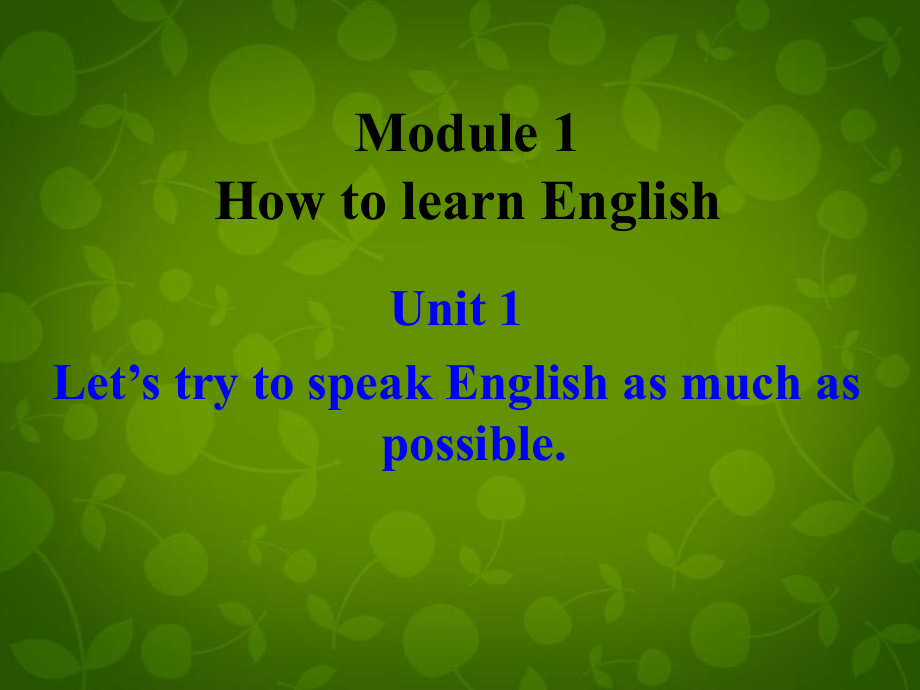《八年級(jí)英語(yǔ)上冊(cè) Module 1 Unit 1 Let's try to speak English as much as possible課件 (1)》由會(huì)員分享,可在線(xiàn)閱讀��,更多相關(guān)《八年級(jí)英語(yǔ)上冊(cè) Module 1 Unit 1 Let's try to speak English as much as possible課件 (1)(25頁(yè)珍藏版)》請(qǐng)?jiān)谘b配圖網(wǎng)上搜索。
1��、Module 1How to learn EnglishUnit 1Lets try to speak English as much as possible.Lead-in brainstorm brainstormWhere can we see English in our daily life?3.How do you learn English?1.Do you think its difficult to learn English?2.Whats the most difficult thing in learning English?English is very import
2、ant and useful.Englishs_ingl_ingr_ingw_ingisteneadpeakritHow do you usually learn English?Englishletters_ingl_ingr_ingw_ingisteneadpeakritTo study English,what will you learn at first?Englishsentencevocabularypronunciationlettergrammars_ingl_ingr_ingw_ingisteneadpeakritWhat else do they need to lear
3��、n?Learning Goals1.To learn new phrases and vocabulary.2.To grasp the sentences on how to learn Enghlish.3.Affection(情感態(tài)度):Develop the good habits of learning English.pair p n.一對(duì),一雙��,一副一對(duì),一雙��,一副 correct krekt v.改正改正;調(diào)整調(diào)整 adj.正確的;恰當(dāng)正確的��;恰當(dāng)?shù)牡?spelling speli n.拼寫(xiě);拼法拼寫(xiě)��;拼法 word w:d n.單詞��;消息單詞��;消息 practise prkt
4��、is v.練習(xí)��,實(shí)踐��;練習(xí),實(shí)踐��;meaning min n.意義��;含義;意義��;含義;v.意味著意味著 complete kmpli:t adj.完整的��;完全的完整的;完全的 sentence sentns n.句子��,句子,dictionary diknri n.字典��;字典��;grammar rm n.語(yǔ)法語(yǔ)法 letter let n.信;字母信��;字母 understand,ndstnd v.理解��;理解��;advice dvais n.建議;通知建議��;通知 advise dvaiz v.建議��;勸告建議��;勸告 should ud aux.應(yīng)該��;可能;應(yīng)該��;可能;possible psbl adj.
5��、可能的;可能的��;notebook nutbuk n.筆記本筆記本 forget fget v.忘記��;忽略忘記��;忽略(forgot,forgotten)pronounceprunauns v.發(fā)音��;發(fā)音��;pronunciation pru,nnsiein n.發(fā)音��;讀法發(fā)音;讀法 aloud laud adv.大聲地大聲地 radio reidiu n.收音機(jī)收音機(jī) key ki n.鍵��;關(guān)鍵��;鑰匙鍵;關(guān)鍵��;鑰匙 adj.關(guān)鍵的關(guān)鍵的 main mein adj.主要的主要的 excellent ekslnt adj.卓越的;極好的卓越的��;極好的 agree ri:v.同意;贊成同意��;贊成 Li
6、sten to the conversation and answer the questions What are they doing?What are they talking about?They are having an English class/lesson.They are talking about how to learn English.表示表示提建議提建議的句型有:的句型有:1.How/What about?2.Would you like?3.Lets 4.Why dont you?5.Why not?6.You should/shouldnt 7.Its a go
7、od idea to do.doing sth.to do sth.do sth.常用的回答是:常用的回答是:Thats a good/great idea.OK./All right.I going to give you some advice.我打算給你們一些我打算給你們一些建議建議 advice 表示表示“建議建議,忠告忠告”,是是不可數(shù)名詞不可數(shù)名詞。要表示��。要表示“一條建議一條建議”,應(yīng)用應(yīng)用a piece of advice;“一句忠一句忠告告”為為a word of advice��。“采納某人的建議采納某人的建議”follow/take ones advice��。“在在方面的建議方
8��、面的建議”用介詞用介詞on或或for。注意��。注意advice的動(dòng)詞是的動(dòng)詞是advise,常用詞組為常用詞組為advise sb.to do sth.��。e.g 我們建議他們及早開(kāi)始。我們建議他們及早開(kāi)始��。We advised them to start early.give sb.sth.give sth.to sb.should 動(dòng)詞原型動(dòng)詞原型 -“應(yīng)該做某事應(yīng)該做某事”Eg.He should come here early.shouldnt=should notEg.We shouldnt watch TV a lot.You should always speak English i
9、n class.你你應(yīng)該應(yīng)該在課堂上一直說(shuō)英語(yǔ)在課堂上一直說(shuō)英語(yǔ)Why dont you write down the correct words?你為什么不你為什么不寫(xiě)下正確的單詞呢?寫(xiě)下正確的單詞呢��?=Why not write down the correct words?Why dont you do sth?相當(dāng)于相當(dāng)于Why not do sth?是典型的表示建議的句型是典型的表示建議的句型e.g:你為什么不讀英文版的報(bào)紙呢��?你為什么不讀英文版的報(bào)紙呢?Why dont you read a newspaper in English?Why not read a newspaper
10��、 in English?write down寫(xiě)下,記下寫(xiě)下��,記下,是個(gè)��,是個(gè)“動(dòng)動(dòng)副型短語(yǔ)副型短語(yǔ)”,當(dāng)名詞作賓語(yǔ)時(shí)��,可以當(dāng)名詞作賓語(yǔ)時(shí),可以 在在 down 之前��,也可以之前,也可以在在 down 之后��。之后。Please write down your name.=Please write your name down.當(dāng)代詞作賓語(yǔ)時(shí)��,代詞只能放在當(dāng)代詞作賓語(yǔ)時(shí),代詞只能放在write down之間��。之間��。Write them down,please.Its a good idea to check your vocabulary notebook every day檢查你的詞匯手冊(cè)檢查你
11��、的詞匯手冊(cè)是一個(gè)好想法是一個(gè)好想法��。Its a good idea to do sth.干某事是一個(gè)好想法干某事是一個(gè)好想法e.g 記下老師的筆記是一個(gè)好想法。記下老師的筆記是一個(gè)好想法��。Its a good idea to write down the teachers notes.本句中的本句中的it是形式主語(yǔ)是形式主語(yǔ),真正的主語(yǔ)是動(dòng)詞不定式��,真正的主語(yǔ)是動(dòng)詞不定式 to check your vocabulary notebook every day��。類(lèi)似的句型:��。類(lèi)似的句型:It is+形容詞形容詞+of/for sb.to do sth,當(dāng)使用描述不定式行為者的當(dāng)使用描述不定式行為
12��、者的性格或品質(zhì)的形容詞性格或品質(zhì)的形容詞,如如 kind,good,nice,right,wrong,clever,careless,polite,foolish等時(shí)用等時(shí)用 of sb��。Its very kind of you to help me.你能幫我真好。你能幫我真好��。當(dāng)使用描述事物的形容詞當(dāng)使用描述事物的形容詞,如��,如difficult,easy,hard,important,dangerous,(im)possible等時(shí)用等時(shí)用for sb.��。Its difficult for us to finish the work.對(duì)我們來(lái)說(shuō),完成這項(xiàng)工作很困難��。對(duì)我們來(lái)說(shuō),完成這項(xiàng)工作
13��、很困難。How about listening to the radio in English?聽(tīng)英語(yǔ)廣播怎么樣��?聽(tīng)英語(yǔ)廣播怎么樣?=What about listening to radio in English?What about/How about doing sth?做某事怎么樣��?做某事怎么樣��?e.g 玩游戲怎么樣?玩游戲怎么樣��?How about/What about playing games?But try not to translate every word.但是但是盡量不要盡量不要去翻譯每一個(gè)單詞��。去翻譯每一個(gè)單詞��。try to do sth 努力做某事努力做某事try
14、not to do sth 盡量不要干某事盡量不要干某事e.g we should try hard to learn English well.we should try not to make any mistakes.try doing sth 嘗試做某事嘗試做某事The boys are trying to draw horses.other,else 都有都有“別的,其他的別的��,其他的”之意之意��。它們的區(qū)別是:它們的區(qū)別是:other修飾名詞,位于名詞之前��。修飾名詞,位于名詞之前��。Whats that in your other hand?你的另一只手里拿著什么��?你的另一只手里拿著什
15、么��?else 修飾不定代詞��、疑問(wèn)代詞或疑問(wèn)副修飾不定代詞��、疑問(wèn)代詞或疑問(wèn)副 詞��,必須位于這些詞之后。詞��,必須位于這些詞之后��。Where else did you go?你還去了別的什么地方��?你還去了別的什么地方��?What else?還有別的什么嗎��?還有別的什么嗎��?She can help me with my homework.help sb with sth=help sb do sth 幫助某人做某事幫助某人做某事e.g 我經(jīng)常幫媽媽做家務(wù)。我經(jīng)常幫媽媽做家務(wù)��。I often help mum with the housework.I often help mum do the house
16、work.Give some advice about learning English advicesing English songscheck your vocabulary notebook every dayread newspapers in Englishlisten to the radio in Englishwrite to each other in Englishplay games about Englishwatch English filmsread English books1)Why dont you do?2)You should do?3)How/What
17��、 about doing?4)Its a good idea to do speakingWhy dont youWhy dont you sing English songssing English songs?You shouldYou should sing English songssing English songs.How aboutHow about singing English songssinging English songs?Its a good idea toIts a good idea to sing Englishsing Englishsongs.songs.
18、Groupwork 課堂小結(jié)1.To summorise and consolidate grammar focus.總結(jié)并鞏固語(yǔ)法重點(diǎn)��。Why dont you How about doing?should/shouldnt try not to do(重點(diǎn))2.To consolidate phrases and vocabulary.3.Affection(情感態(tài)度):Develop the good habit of learning English.Listen and repeat.1.Follow the tape to read the sentences:(1)Why dont you write it down?(2)What else?(3)Thats a good idea.(4)Thanks a lot.2.In pairs,read the dialogue loudly.HomeworkDo you want to improve your English?Write some advice for yourself.
 八年級(jí)英語(yǔ)上冊(cè) Module 1 Unit 1 Let's try to speak English as much as possible課件 (1)
八年級(jí)英語(yǔ)上冊(cè) Module 1 Unit 1 Let's try to speak English as much as possible課件 (1)

